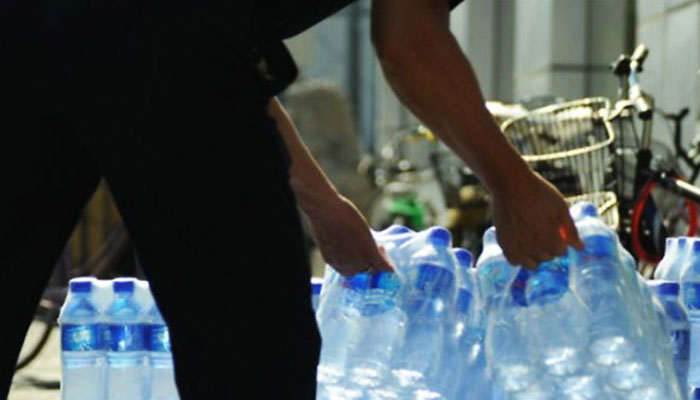27 bottled water brands found harmful
Dr Hifza says under direction of federal cabinet, quarterly water samples were collected from 24 cities for testing
ISLAMABAD: A recent study has revealed that 27 brands of bottled mineral water, sold across cities and villages under the guise of clean drinking water, are potentially hazardous to health.
Some brands contained excessive levels of sodium, arsenic and potassium, while others were bacterially contaminated. Consumption of these contaminated brands could lead to serious health issues, including various cancers, kidney and heart diseases, high blood pressure, stomach infections like cholera and nervous system disorders.
The federal government, through the Ministry of Science and Technology, had designated the Pakistan Council of Research in Water Resources (PCRWR) the task of quarterly monitoring of bottled mineral water brands to improve the quality of bottled water. According to the monitoring report for the fourth quarter of 2024 – October to December – 176 samples of mineral/bottled water brands were collected from 20 cities.
PCRWR Director General Dr Hifza Rasheed said that comparison of test results with the bottled water quality standards of Pakistan Standards & Quality Control Authority (PSQCA) revealed that 27 brands were unsafe for human consumption due to microbiological or chemical contamination. The report showed that nine brands, including Miran Drinking Water Pak Aqua, Jel Bottled Water, Neo, Eltsen, Pure Water, Aqua Health, Oslo, More Plus were found to be unsafe due to the presence of higher levels of sodium. Also, five brands including One Pure Drinking Water, Indus, Premium Safa Purified Water, Orwell, and Natural Pure Life was found to be unsafe due to presence of higher levels of arsenic; while, one brand, Hunza Utter Water, were found unsafe due to presence of high level of potassium than the permissible limit. The report showed that 16 brands including SS Water, Sip Premium Drinking Water, Miran Drinking Water, D-Nova, Sky Rain, Neo, Pure Water, Dream Pure, Aqua Sharav Pure Drinking Water, Marvi, Ice Well, Akb Sky, Karakorum Spring Water, More Plus, Essentia, Life Inn were found contaminated with bacteria and thus were unsafe for drinking purposes.
Dr Hifza Rashid explained that under the direction of the federal cabinet, quarterly water samples were collected from 24 cities nationwide for testing. The results are then forwarded to the Pakistan Standard and Quality Control Authority (PSQCA) and the four provincial chief secretaries for appropriate legal action. She said that PCRWR’s role was limited to conducting water tests every three months, uploading the findings to the relevant institutions and public websites.
She clarified that issuing licenses for bottled water companies was the responsibility of other authorities, and legal actions against companies selling substandard water were handled by those institutions. When attempts were made to contact the owners of the water companies, flagged for substandard water, their responses were minimal. Some claimed the company had been sold, others said the owners were unavailable, and several calls went unanswered. However, a few companies defended their products and contended that they were following standards.
Meanwhile, Ashraf Player, Director of Licensing at PSQCA, explained the rigorous process for issuing licenses to bottled water plants. He stated the PSQCA conducts thorough inspections before granting a license. The process involves third-party checks, followed by review by the scrutiny committee and approval from the director general. Once approved, the license is issued, he added. Ashraf further noted that if water from any company violates hygiene standards, random checks are conducted three times. Should the water remain unsatisfactory, the company’s licence is revoked and its production facility sealed. He acknowledged that the PSQCA faces significant staff shortages, citing that in Karachi, only seven inspectors are responsible for monitoring the region, despite the agency’s national oversight duties.
-
 How Liam Payne’s Death Impacted Awareness About Mental Health
How Liam Payne’s Death Impacted Awareness About Mental Health -
 Scientists Reveal How Sleeping Can Unlock Your Creative Potential
Scientists Reveal How Sleeping Can Unlock Your Creative Potential -
 OpenAI CEO Calls AI Water Concerns ‘fake’
OpenAI CEO Calls AI Water Concerns ‘fake’ -
 Taylor Swift Expresses How Negative Body Comments Triggered Her
Taylor Swift Expresses How Negative Body Comments Triggered Her -
 Prince William Plans Bold Shake-up To Restore Public Trust Amid Andrew Drama
Prince William Plans Bold Shake-up To Restore Public Trust Amid Andrew Drama -
 Apple IPhone 18 Pro Series To Launch In Bold Red Colour: Report
Apple IPhone 18 Pro Series To Launch In Bold Red Colour: Report -
 Apple Developing AI Pendant Powered By In-house Visual Models
Apple Developing AI Pendant Powered By In-house Visual Models -
 'Gilmore Girls' Milo Ventimiglia Shares How He Would React If His Daughter Ke'ala Coral Chose 'team Dean'
'Gilmore Girls' Milo Ventimiglia Shares How He Would React If His Daughter Ke'ala Coral Chose 'team Dean' -
 New AGI Benchmark: Demis Hassabis Proposes ‘Einstein Test’—Ultimate Challenge To Prove True Intelligence
New AGI Benchmark: Demis Hassabis Proposes ‘Einstein Test’—Ultimate Challenge To Prove True Intelligence -
 NASA Artemis 2 Moon Mission Faces Unexpected Delay Ahead Of March Launch
NASA Artemis 2 Moon Mission Faces Unexpected Delay Ahead Of March Launch -
 Kate Middleton Reclaims Spotlight With Confidence Amid Andrew Drama
Kate Middleton Reclaims Spotlight With Confidence Amid Andrew Drama -
 Lady Gaga Details How Eating Disorder Affected Her Career: 'I Had To Stop'
Lady Gaga Details How Eating Disorder Affected Her Career: 'I Had To Stop' -
 Why Elon Musk Believes Guardrails Or Kill Switches Won’t Save Humanity From AI Risks
Why Elon Musk Believes Guardrails Or Kill Switches Won’t Save Humanity From AI Risks -
 'Devastated' Richard E. Grant Details How A Friend Of Thirty Years Betrayed Him: 'Such Toxicity'
'Devastated' Richard E. Grant Details How A Friend Of Thirty Years Betrayed Him: 'Such Toxicity' -
 Rider Strong Finally Unveils Why He Opposed The Idea Of Matthew Lawrence’s Inclusion In 'Boy Meets World'
Rider Strong Finally Unveils Why He Opposed The Idea Of Matthew Lawrence’s Inclusion In 'Boy Meets World' -
 Who Was ‘El Mencho’? Inside The Rise And Fall Of Mexico’s Most Wanted Drug Lord Killed In Military Operation
Who Was ‘El Mencho’? Inside The Rise And Fall Of Mexico’s Most Wanted Drug Lord Killed In Military Operation




